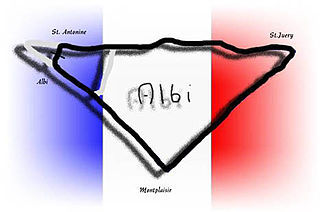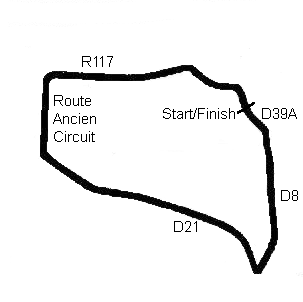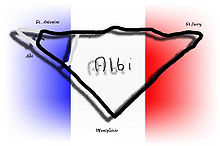
Maurice Bienvenu Jean Paul Trintignant was a motor racing driver and vintner from France. He competed in the Formula One World Championship for fourteen years, between 1950 and 1964, one of the longest careers in the early years of Formula One. During this time he also competed in sports car racing, including winning the 1954 24 Hours of Le Mans race. Following his retirement from the track Trintignant concentrated on the wine trade.

José Froilán González was an Argentine racing driver, particularly notable for scoring Ferrari's first win in a Formula One World Championship race at the 1951 British Grand Prix. He made his Formula One debut for Scuderia Achille Varzi in the 1950 Monaco Grand Prix. His last Grand Prix was the 1960 Argentine Grand Prix.

The 1951 Formula One season was the fifth season of FIA Formula One motor racing. It featured the 1951 World Championship of Drivers, which commenced on 27 May 1951 and ended on 28 October after eight races. The season also included 14 races open to Formula One cars but did not count towards the championship standings.

Louis Rosier was a racing driver from France.
Tom Belsø was a motor racing driver, credited as the first Formula One driver from Denmark.
Francisco Sacco Landi, better known as Chico, was a racing driver from São Paulo, Brazil. He participated in six Formula One World Championship Grands Prix, debuting on September 16, 1951. He scored a total of 1.5 championship points, awarded for his fourth-place finish in the 1956 Argentine Grand Prix, a drive he shared with Gerino Gerini. He was the first Brazilian ever to take part in a Formula One Grand Prix, and also the first to score points.

The Autódromo de Buenos Aires Oscar y Juan Gálvez is a 45,000 capacity motor racing circuit in Buenos Aires, Argentina built in 1952 under president Juan Perón, named Autódromo 17 de Octubre after the date of Loyalty Day until Perón's overthrow. It was later renamed after Argentinian racing driver brothers, Juan Gálvez (1916–1963) and Oscar Alfredo Gálvez (1913–1989).

After finding only modest success with the supercharged 125 F1 car in Formula One, Ferrari decided to switch for 1950 to the naturally aspirated 4.5-litre formula for the series. Calling in Aurelio Lampredi to replace Gioacchino Colombo as technical director, Enzo Ferrari directed that the company work in stages to grow and develop an entirely new large-displacement V12 engine for racing.

The 1951 Grand Prix motorcycle racing season was the third F.I.M. Road Racing World Championship Grand Prix season. The season consisted of eight Grand Prix races in five classes: 500cc, 350cc, 250cc, 125cc and Sidecars 500cc. It began on 8 April, with Spanish Grand Prix and ended with Nations Grand Prix on 9 September. As of 2022, this is the most recent season the premier class was won by a non-Japanese or non-Italian constructor.

The Maserati Tipo 26M was a model of Grand Prix race car produced by Italian manufacturer Maserati in Bologna, for a total of 13 units, between 1930 and 1932.

The Circuit d'Albi is a 3.565 km (2.215 mi) motorsport race track located in the French town of Le Sequestre near Albi, about 80 km (50 mi) northeast of Toulouse. Built to replace the nearby Circuit Les Planques public road circuit, Albi has 70 years of history in motor-racing, including the 1951 French motorcycle Grand Prix. It hosted the FFSA GT Championship in 1997, 2002–2011, and 2020–2022.
Henry Leslie Brooke, was a British racing driver from England. He competed in various classes of racing, including non-championship Formula One, the Le Mans 24-hour race and the Monte Carlo Rally, in the 1930s, 1940s and 1950s.

The XVII Grand Prix d'Albi was a motor race, run to Formula One rules, held on 29 May 1955 at Circuit Les Planques, Albi. The race was run over 105 laps of the circuit, and was won by French driver André Simon in a Maserati 250F. Simon also set pole and fastest lap.

The XIII Grand Prix d'Albi was a motor race, run to Formula One rules, held on 5 August 1951 at the Circuit Les Planques, Albi. The race was run over 34 laps of the circuit, and was won by French driver Maurice Trintignant in a Simca-Gordini Type 15. Trintignant also set pole and fastest lap. Louis Rosier and Louis Chiron were second and third in their Talbot-Lago T26Cs.

The 6th Ulster Trophy was a non-championship Formula One motor race held at the Dundrod Circuit on 7 June 1952. The race was won from pole position by Piero Taruffi in a Ferrari 375, setting fastest lap in the process. Mike Hawthorn in a Cooper T20-Bristol was second and Joe Kelly third in an Alta GP.
The 2nd Daily Mail Trophy was a non-championship motor race held for Formula One and Formula Two cars at Boreham Circuit on 2 August 1952. The race was won by Luigi Villoresi in a Ferrari 375, who also set pole and fastest lap. Chico Landi was second in another 375 and Mike Hawthorn was third in a Cooper T20-Bristol, and highest place Formula Two entrant.

The XVI Grand Prix du Comminges was a Formula Two motor race held on 10 August 1952 in Saint-Gaudens, Haute-Garonne, France. It was round 7 of Les Grands Prix de France Championship. Race distance was determined by time rather than the number of laps, the result being declared after 3 hours. The win was shared by André Simon and Alberto Ascari in a Ferrari 500; Ascari taking over Simon's car after his own suffered mechanical failure. Ascari had started from pole, and also set fastest lap. Their teammate Giuseppe Farina finished second and Jean Behra in a Simca Gordini Type 15 was third.

The XV Grand Prix de l'Albigeois was a combined Formula One and Formula Two motor race held on 31 May 1953 at Circuit Les Planques, Albi, France. The race was held over two heats of 10 laps; one for Formula One and one for Formula Two, and a final of 18 laps in which both classes took part. The top four finishers in each heat qualified for the final, plus another four based on finishing position.

The Albi Grand Prix is a motor race held in Albi, in the Tarn department of Southern France. The first race took place in 1933 and was won by Pierre Veyron in a Bugatti Type 51A. After the Second World War, the Grand Prix was run to Formula One regulations for many years until, following the 1955 Le Mans disaster, racing at Circuit Les Planques came to an end.

Circuit Les Planques was a 9.226 km (5.733 mi) long motor racing road circuit in a triangular shape, located near Albi. The circuit was later shortened to 8.911 km (5.537 mi) in 1934, and again to 2.991 km (1.859 mi) in 1954.













